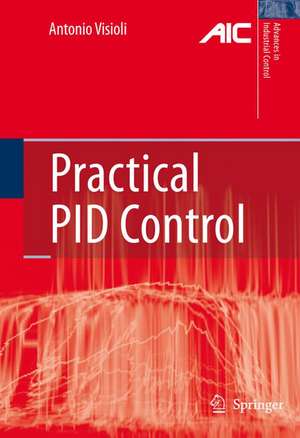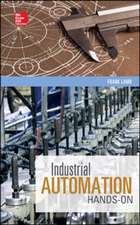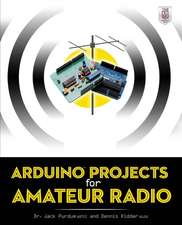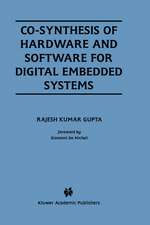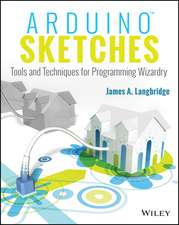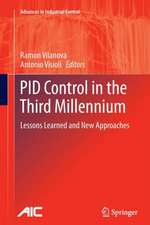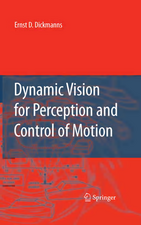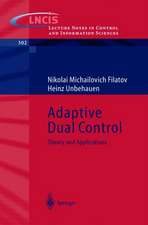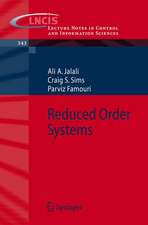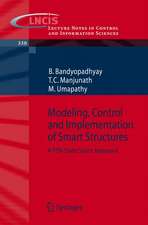Practical PID Control: Advances in Industrial Control
Autor Antonio Visiolien Limba Engleză Hardback – 11 oct 2006
"Practical PID Control" focuses on those functionalities that can provide significant improvements in PID performance in combination with parameter tuning. In particular, the choice of filter to make the controller proper, the use of a feedforward action and the selection of an anti-windup strategy are addressed. The choices of identification algorithm and model reduction technique are analysed in the context of model-based PID control. Widely adopted PID-based control architectures (ratio and cascade control) and performance assessment are also covered. Simulation and experimental results are provided better to illustrate the different methodologies and to discuss their pros and cons.
| Toate formatele și edițiile | Preț | Express |
|---|---|---|
| Paperback (1) | 946.10 lei 6-8 săpt. | |
| SPRINGER LONDON – 21 oct 2010 | 946.10 lei 6-8 săpt. | |
| Hardback (1) | 950.66 lei 6-8 săpt. | |
| SPRINGER LONDON – 11 oct 2006 | 950.66 lei 6-8 săpt. |
Din seria Advances in Industrial Control
- 15%
 Preț: 643.34 lei
Preț: 643.34 lei - 23%
 Preț: 582.63 lei
Preț: 582.63 lei - 18%
 Preț: 783.98 lei
Preț: 783.98 lei - 18%
 Preț: 947.35 lei
Preț: 947.35 lei - 20%
 Preț: 568.24 lei
Preț: 568.24 lei - 15%
 Preț: 643.16 lei
Preț: 643.16 lei - 18%
 Preț: 899.21 lei
Preț: 899.21 lei - 18%
 Preț: 891.33 lei
Preț: 891.33 lei - 18%
 Preț: 740.57 lei
Preț: 740.57 lei - 18%
 Preț: 961.23 lei
Preț: 961.23 lei - 18%
 Preț: 955.08 lei
Preț: 955.08 lei - 15%
 Preț: 645.28 lei
Preț: 645.28 lei - 15%
 Preț: 638.43 lei
Preț: 638.43 lei - 18%
 Preț: 901.11 lei
Preț: 901.11 lei - 18%
 Preț: 1410.94 lei
Preț: 1410.94 lei - 18%
 Preț: 728.91 lei
Preț: 728.91 lei - 20%
 Preț: 1003.78 lei
Preț: 1003.78 lei - 18%
 Preț: 947.35 lei
Preț: 947.35 lei - 15%
 Preț: 643.34 lei
Preț: 643.34 lei - 15%
 Preț: 654.30 lei
Preț: 654.30 lei - 18%
 Preț: 950.52 lei
Preț: 950.52 lei - 15%
 Preț: 644.30 lei
Preț: 644.30 lei - 18%
 Preț: 1393.09 lei
Preț: 1393.09 lei - 18%
 Preț: 950.21 lei
Preț: 950.21 lei - 18%
 Preț: 949.90 lei
Preț: 949.90 lei - 18%
 Preț: 949.42 lei
Preț: 949.42 lei - 18%
 Preț: 950.52 lei
Preț: 950.52 lei - 18%
 Preț: 1113.71 lei
Preț: 1113.71 lei - 15%
 Preț: 650.04 lei
Preț: 650.04 lei - 15%
 Preț: 644.95 lei
Preț: 644.95 lei - 18%
 Preț: 950.33 lei
Preț: 950.33 lei - 18%
 Preț: 948.61 lei
Preț: 948.61 lei - 18%
 Preț: 1112.60 lei
Preț: 1112.60 lei - 15%
 Preț: 644.63 lei
Preț: 644.63 lei - 18%
 Preț: 953.20 lei
Preț: 953.20 lei - 18%
 Preț: 945.62 lei
Preț: 945.62 lei - 15%
 Preț: 640.88 lei
Preț: 640.88 lei - 15%
 Preț: 640.88 lei
Preț: 640.88 lei - 20%
 Preț: 650.92 lei
Preț: 650.92 lei - 18%
 Preț: 1112.60 lei
Preț: 1112.60 lei - 20%
 Preț: 998.36 lei
Preț: 998.36 lei - 15%
 Preț: 643.34 lei
Preț: 643.34 lei - 18%
 Preț: 948.92 lei
Preț: 948.92 lei - 18%
 Preț: 1381.43 lei
Preț: 1381.43 lei - 15%
 Preț: 651.51 lei
Preț: 651.51 lei - 15%
 Preț: 647.08 lei
Preț: 647.08 lei - 20%
 Preț: 563.66 lei
Preț: 563.66 lei - 18%
 Preț: 992.64 lei
Preț: 992.64 lei - 18%
 Preț: 1225.79 lei
Preț: 1225.79 lei
Preț: 950.66 lei
Preț vechi: 1159.34 lei
-18% Nou
Puncte Express: 1426
Preț estimativ în valută:
181.97€ • 197.72$ • 152.95£
181.97€ • 197.72$ • 152.95£
Carte tipărită la comandă
Livrare economică 21 aprilie-05 mai
Preluare comenzi: 021 569.72.76
Specificații
ISBN-13: 9781846285851
ISBN-10: 1846285852
Pagini: 332
Ilustrații: XVIII, 314 p.
Dimensiuni: 155 x 235 x 23 mm
Greutate: 0.59 kg
Ediția:2006
Editura: SPRINGER LONDON
Colecția Springer
Seria Advances in Industrial Control
Locul publicării:London, United Kingdom
ISBN-10: 1846285852
Pagini: 332
Ilustrații: XVIII, 314 p.
Dimensiuni: 155 x 235 x 23 mm
Greutate: 0.59 kg
Ediția:2006
Editura: SPRINGER LONDON
Colecția Springer
Seria Advances in Industrial Control
Locul publicării:London, United Kingdom
Public țintă
ResearchCuprins
Basics of PID Control.- Derivative Filter Design.- Anti-windup Strategies.- Set-point Weighting.- Use of a Feedforward Action.- Plug&Control.- Identification and Model Reduction Techniques.- Performance Assessment.- Control Structures.
Recenzii
From the reviews:
"Visioli's book covers the newest techniques of PID controllers in many areas. There are clearly explained and vividly demonstrated. It is evident that Visioli himself has contributed significantly to many of the topics covered. The book has also an excellent list of references to recent literature...
...Visioli should be congratulated for his effors and novel ways of treating PID control."
IEEE Transactions on Automatic Control, 53 (2008), 2217-2218, (Reviewer: Heikki N. Koivo)
The text of Practical PID Control provides a nice review of proportional-integral-derivative (PID) design and implementation... This book will provide the user with a good reference to identify and implement an optimized PID design, including one reference to use of fuzzy logic in variable set point weighting design.
The text provides several mechanisms for achieving good results from your application using PID control, which in some cases may be the only method available to the user. When there are other options, however, a modified PID can also provide an effective means of achieving good performance without excessive engineering time. This text, while focusing on the former, provides several references to latter 'fusion' approaches for achieving good control. What the text may lack in depth is made up for in coverage of the topic of practical PID control. The text as written would be a helpful reference to the undergraduate practitioner with a classical controls background or a graduate-level controls engineer with implementation experience.
International Journal of Robust and Nonlinear Control 19 (2009) 1076 – 1078 (Reviewer: Craig Rieger)
"Visioli's book covers the newest techniques of PID controllers in many areas. There are clearly explained and vividly demonstrated. It is evident that Visioli himself has contributed significantly to many of the topics covered. The book has also an excellent list of references to recent literature...
...Visioli should be congratulated for his effors and novel ways of treating PID control."
IEEE Transactions on Automatic Control, 53 (2008), 2217-2218, (Reviewer: Heikki N. Koivo)
The text of Practical PID Control provides a nice review of proportional-integral-derivative (PID) design and implementation... This book will provide the user with a good reference to identify and implement an optimized PID design, including one reference to use of fuzzy logic in variable set point weighting design.
The text provides several mechanisms for achieving good results from your application using PID control, which in some cases may be the only method available to the user. When there are other options, however, a modified PID can also provide an effective means of achieving good performance without excessive engineering time. This text, while focusing on the former, provides several references to latter 'fusion' approaches for achieving good control. What the text may lack in depth is made up for in coverage of the topic of practical PID control. The text as written would be a helpful reference to the undergraduate practitioner with a classical controls background or a graduate-level controls engineer with implementation experience.
International Journal of Robust and Nonlinear Control 19 (2009) 1076 – 1078 (Reviewer: Craig Rieger)
Notă biografică
Antonio Visioli’ research interests include industrial robot control and trajectory planning, dynamic inversion-based control and process control. He is a reviewer for several control-related journals and collaborates wit hthe industrial concerns:Yokogawa Italia srl (www.yokogawa.it) and with Paneutec srl (www.paneutec.com) doing research ob performance assessment and conducting seminars for them.
Textul de pe ultima copertă
Proportional–integral–derivative (PID) controllers are the most adopted controllers in industrial settings because of the advantageous cost/benefit ratio they are able to provide. Despite their long history and the know-how gained from years of experience, the availability of microprocessors and software tools and the increasing demand for higher product quality at reduced cost have stimulated researchers to devise new methodologies to improve their performance and make them easier to use.
Practical PID Control covers important issues that arise when a PID controller is to be applied in practical cases. Its focus is on those functionalities that can provide significant improvements in performance in combination with a sound tuning of parameters. In particular, the choice of filter to make the controller proper, the use of a feedforward action and the selection of an anti-windup strategy are addressed. Further, the choice of the identification algorithm and of the model reduction technique are analysed in the context of model-based PID control. Widely adopted PID-based control architectures (ratio and cascade control) and performance assessment are also covered. For these topics, recent contributions are explained and compared with more standard approaches. A large number of simulation and experimental results are provided in order better to illustrate the different methodologies and to discuss their pros and cons. Practical PID Control is a helpful and instructive reference for researchers, graduate students and practitioners in process control.
Advances in Industrial Control aims to report and encourage the transfer of technology in control engineering. The rapid development of control technology has an impact on all areas of the control discipline. The series offers an opportunity for researchers to present an extended exposition of new work in all aspects of industrial control.
Practical PID Control covers important issues that arise when a PID controller is to be applied in practical cases. Its focus is on those functionalities that can provide significant improvements in performance in combination with a sound tuning of parameters. In particular, the choice of filter to make the controller proper, the use of a feedforward action and the selection of an anti-windup strategy are addressed. Further, the choice of the identification algorithm and of the model reduction technique are analysed in the context of model-based PID control. Widely adopted PID-based control architectures (ratio and cascade control) and performance assessment are also covered. For these topics, recent contributions are explained and compared with more standard approaches. A large number of simulation and experimental results are provided in order better to illustrate the different methodologies and to discuss their pros and cons. Practical PID Control is a helpful and instructive reference for researchers, graduate students and practitioners in process control.
Advances in Industrial Control aims to report and encourage the transfer of technology in control engineering. The rapid development of control technology has an impact on all areas of the control discipline. The series offers an opportunity for researchers to present an extended exposition of new work in all aspects of industrial control.
Caracteristici
Gives the reader new methods for improving the performance of the most widely applied form of control in industry Demonstrates how the new functionality can be added to a controller without compromising its simplicity of use Offers solutions to practical problems facing the control engineer using PID Includes supplementary material: sn.pub/extras
